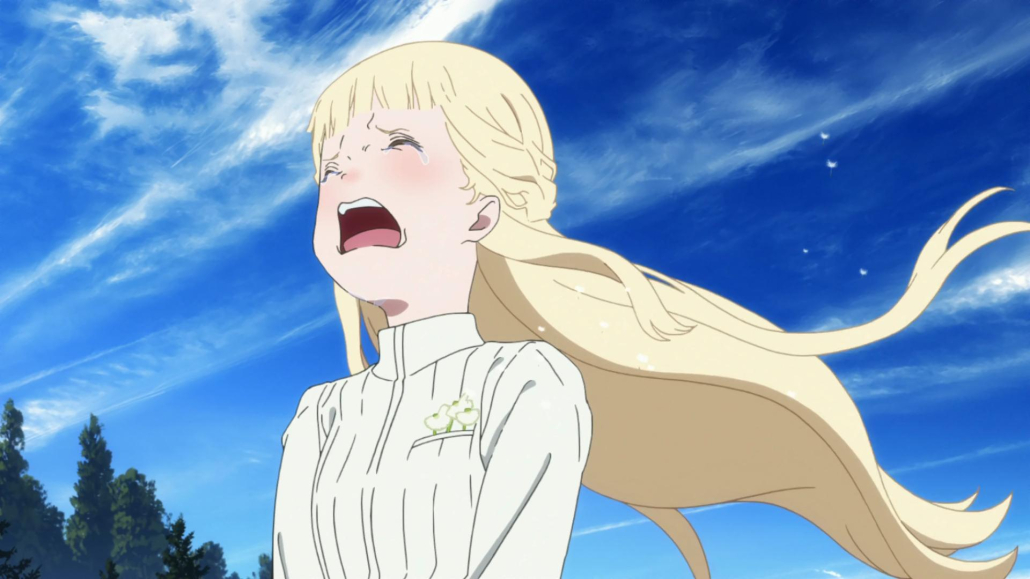Tear-jerking anime to kickstart your spring allergies

Ah, spring. Flowers are blooming, insects are swarming, the sun is shining — and, of course, your allergies are acting up again.
Is there anything good about the seasonal snuffles? At least they provide a good excuse when you bawl over the following movies. Don’t be embarrassed, these classic works of anime are fine-tuned with stunning landscapes and fantastic narratives to tug at your every tear duct … or maybe it’s just the pollen.
“When Marnie Was There” (2015)
This particular Studio Ghibli film warrants some extra appreciation for its intricate depiction of identity and growing up. Anna (Hailee Steinfeld) has a hard time getting along with classmates. Concerned about Anna’s asthma attacks, her aunt and uncle invite her to stay with them for the summer in a small country town where she encounters Marnie (Kieran Shipka), a girl that lives in an old mansion across the marsh. Befriending Marnie, Anna gradually realizes that the mysterious girl is closer to her than she expected. The truths unveiled in Anna’s journey of self-discovery pose tender and relatable questions about family and home, especially in the midst of growing up.
Resulting symptoms:
• Randomly strong desires to take a vacation in a rural town that happens to have old mansions.
• (Unfortunately) remembering what you may or may not have been like during your twelve year old emo phase.
“Maquia: When the Promised Flower Blooms” (2018)
The immortal versus mortal trope. Maquia (Manaka Iwami), a girl of the mystical lorph race, is caught in a war on her people when she finds a human infant amid the destruction. Despite being a child herself, she’s touched by his helplessness and raises him as her son. But the tensions between the lorph and human race complicate the boy, Ariel (Miyu Irino) and Maquia’s relationship, eventually splitting them apart. “Maquia” comments on the notion of immortality and the complications that arise therein and the importance of family, blood related or not.
Resulting symptoms:
• Frequent, deep and long sighs of resignation.
• Prickling, teary eyes for the next 10 business days.
“Violet Evergarden: the Movie” (2020)
Now, this is technically the finale of a TV series, but what’s the unpredictable Los Angeles spring for if not cuddling up inside and binging a whole series in a few days? Violet Evergarden (Yui Ishikawa) is an orphan and former child soldier who assimilates into postwar society by working at a postal company as a letter writer, hoping to ultimately discover the meaning of love. Encountering different types of clients, she improves in her writing skills as time passes. Yet, Violet still holds onto the hope that her beloved commanding officer, who was declared missing-in-action, is still alive. The science fiction elements contrast with the characters’ haunting regrets to evoke a heart wrenching reflection of the difficulty in striving toward a better future.
Resulting symptoms:
• Emotional contagion
• Compulsions to write to a(n) (imaginary) long lost lover
“In This Corner of the World” (2016)
In Hiroshima, Japan, newly married Suzu (Rena Nōnen) navigates life before and during World War II. Facing the daily loss of subsistence and supplies, she must help her family survive wartime. Amid the destruction and fast-paced changes, Suzu struggles to stay alive and define her ability to protect her family. When the war threatens to destroy everything that she treasures, the hope for the future is all she can rely on. “In This Corner of the World” puts into perspective the value of small, trivial moments of life amid chaos.
Resulting symptoms:
• Furiously red eyes
• Irreversably runny nose
“A Silent Voice” (2016)
We all know a bully story or two. But this one explores the cruel reality from the bully’s perspective, and the labels that constrained and tore them apart. In grade school, Shoya Ishida (Miyu Irino) bullied Shoko Nishimiya (Saori Hayami), who is hard of hearing, to the point that she had to transfer. What made him hate her so much that he’d do and say terrible things? Years later in high school, Shoya decides to befriend Shoko to take accountability for his deeds. However, it won’t be simple to soothe the wounds inflicted that also affected their classmates and families. Combating the concept of a social survival of the fittest by encouraging the ups and downs of communication, “A Silent Voice” reinforces what listening and seeing those surrounding us, and how our worlds are shaped by what we choose to hear and see.
Resulting symptoms:
• Searching for signs of luck
• More emotional contagion
If you’re the type of person who becomes easily invested in fictional characters, or if you experience any of the aforementioned symptoms, blame it on the pollen content. Or, since we’re in L. A., the air quality. You totally didn’t ugly cry — we won’t tell.

